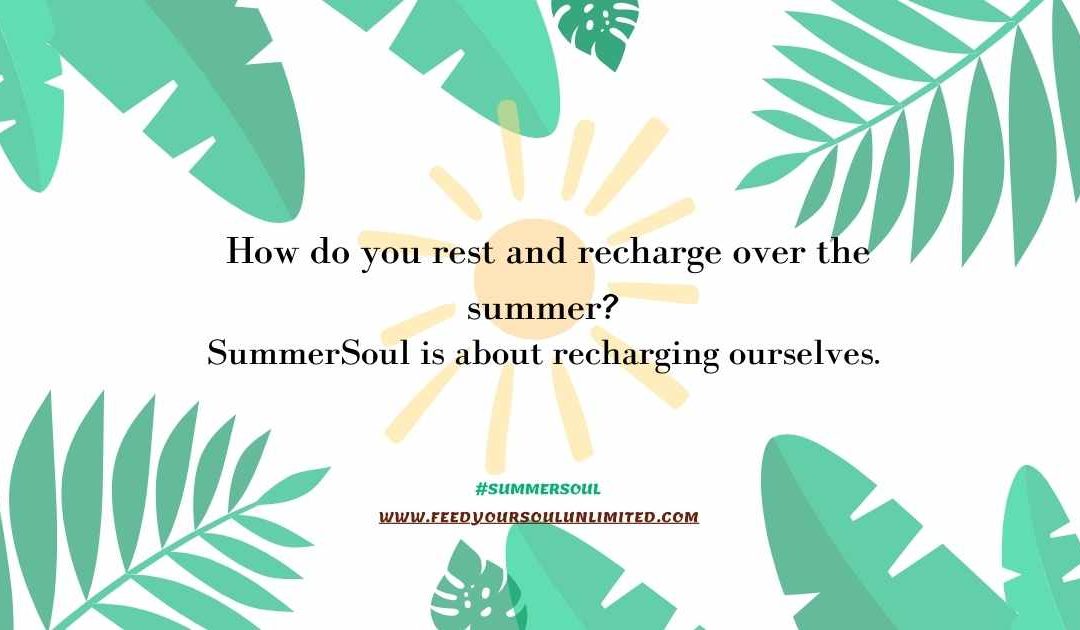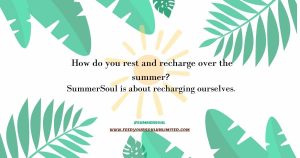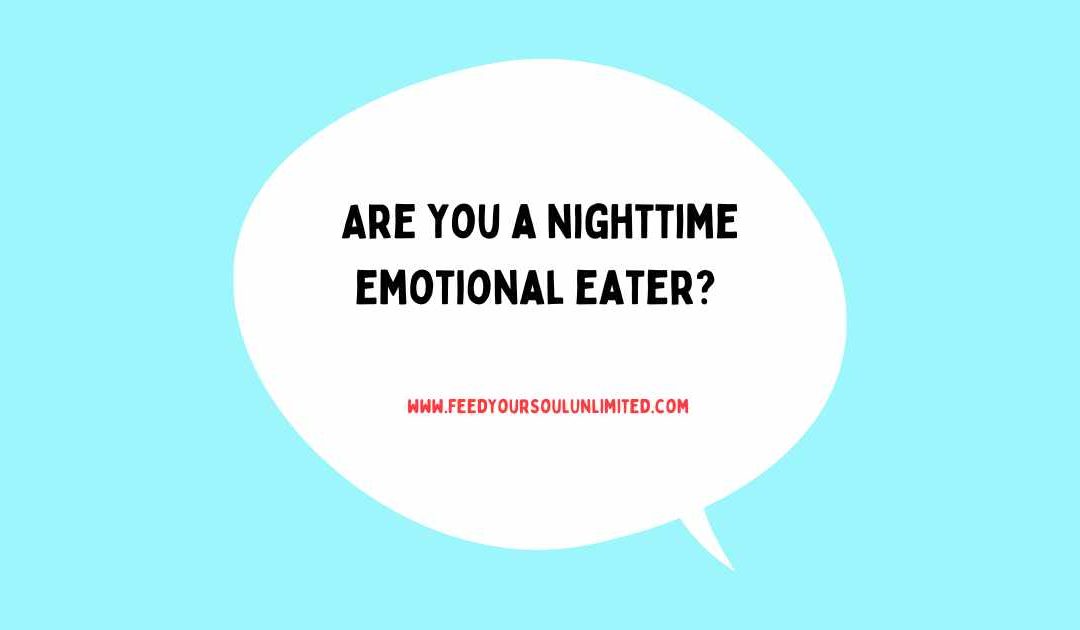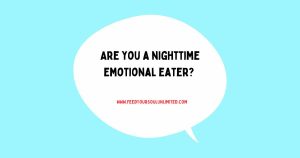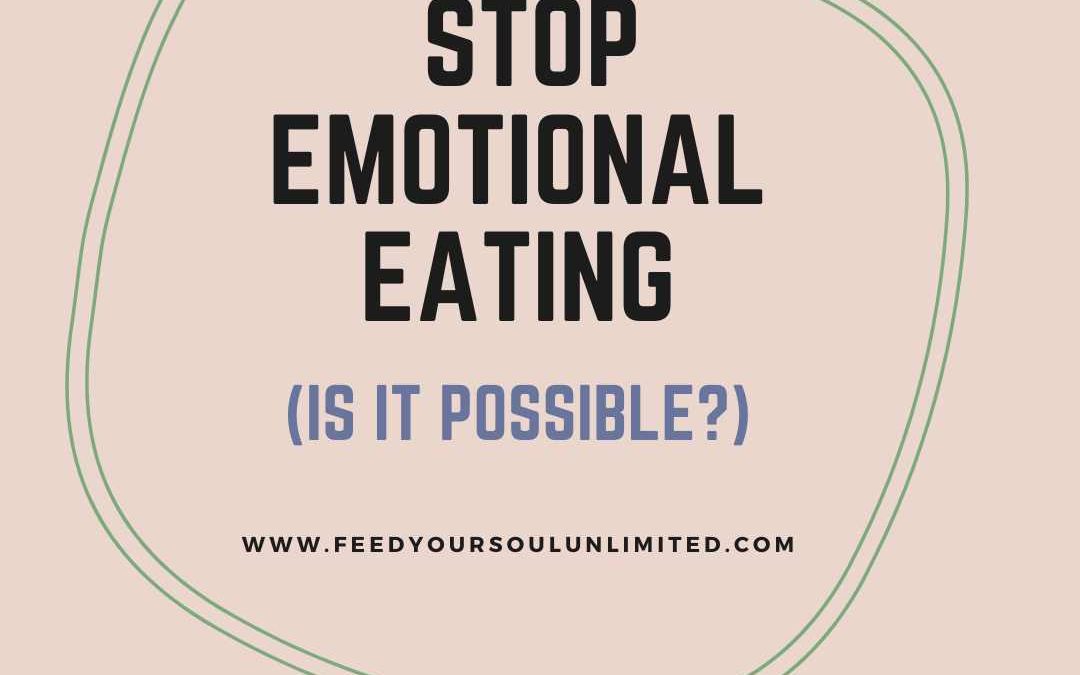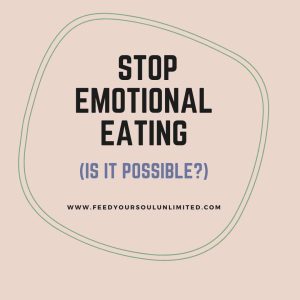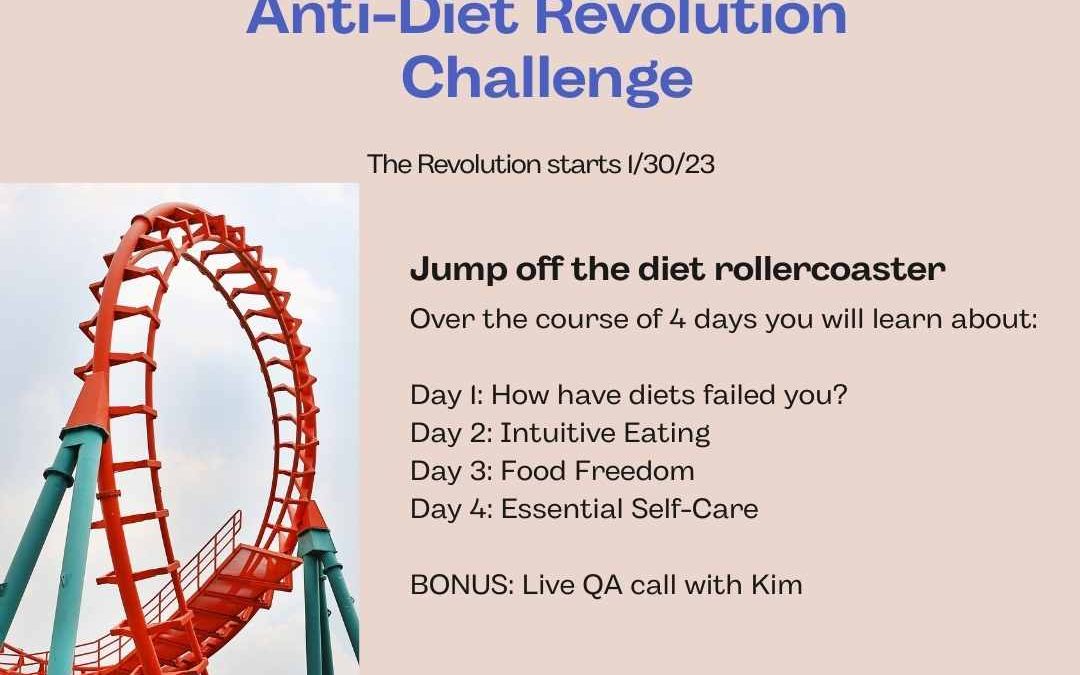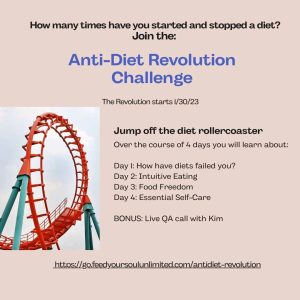
by KimMcLaughlin | Jul 27, 2023 | Self Care





I’m calling this season SummerSoul, because I want to be more soulful this summer. A SummerSoul means you are refocusing on yourself and your needs and what makes you fully happy.
Summertime is often thought of as a carefree and relaxed season, but for many of us, it can be anything but those things. The warmer weather, school break, and family vacations and expectations can make it challenging to balance everything.
It’s easy to get caught up in the summer frenzy and forget about taking care of yourself and setting boundaries.
SummerSoul meants we are prioritizing self-care and boundaries during the summer months, which is crucial for maintaining your mental and physical well-being.
Let’s talk about HOW you can prioritize self-care and set healthy boundaries during the SummerSoul.
First, schedule “Me Time” regularly this SummerSoul
One of the best things you can do for yourself is to schedule regular “me time.” It can be a walk by yourself, a relaxing bubble bath, or a night out with friends. SummerSoul means you are carving out time for yourself.
It can be easy to let your self-care fall by the wayside. You may feel guilty for taking time away from your obligations. However, caring for yourself should never be viewed as a selfish act. It’s essential to prioritize your mental and emotional health. Find a time that works for you AND schedule it on your calendar, just like you would with any other important obligation.
I have been using my Summer Bucket List to help me focus on what I want to prioritize this summer. I have been on my Stand-Up Paddle Board, going on a Ferry ride AND getting to the beach. *Get your Summer Bucket List here.
Second, establish boundaries with others.
Boundaries are crucial for maintaining your physical and emotional well-being. It’s easy to take on too much and neglect your boundaries. You may find yourself saying yes to everything, whether it’s a work obligation or a social event. While it’s great to be involved and active, saying yes to everything can lead to burnout and resentment.
Try to establish clear boundaries. Be honest with yourself and those around you about what you can and cannot handle. SummerSoul means you are saying yes to what you want and no to everything else.
I have been focusing on saying no when something does not fit for me. It is difficult, but I have been more satisfied with how I spend my time.
Third, plan ahead for YOUR SummerSoul.
Planning ahead can be a game-changer when it comes to balancing everything over the summer. Whether it’s meal planning, organizing your work schedule, or planning family activities, having a plan in place can alleviate stress and make things run more smoothly.
During the summer months, it’s crucial to plan ahead for childcare, work obligations, and family vacations. Take some time to set goals and create a plan that works for you and your family.
I have been putting in all of mine and my family’s activities on the calendar to make sure we get all the SummerSoul in that we can. I know what gets scheduled gets done!
Fourth, delegate responsibilities to others.
Recognize that you can’t do everything yourself. It’s okay to ask for help and delegate responsibilities like:
- Asking your partner or kids to take on more household chores.
- Requesting your boss to delegate work tasks to others.
- Seeing if another parent can take over a volunteer task.
Freeing up some time and energy can make a world of difference. Delegation doesn’t mean you’re weak or incapable; it means you’re a responsible and proactive individual who recognizes the importance of balance.
I asked my daughter to do more around the house, since she is out of school. This frees me up to do more for myself.
Fifth, stay present in the moment.
Finally, it’s crucial to stay present and enjoy the little moments during SummerSoul. While it’s essential to take care of yourself and set boundaries, it’s also important to enjoy the time with your family and friends.
Focus on being present and engaged in the moment, whether it’s watching your child’s baseball game or enjoying a family vacation. It’s easy to get caught up in the hustle and bustle of daily life, but taking a step back and appreciating the small moments is key to a happy and fulfilling summer.
Truly experiencing a SummerSoul can be challenging. However, prioritizing self-care and setting healthy boundaries are crucial for maintaining your physical and emotional well-being. Scheduling “me time,” establishing boundaries, planning ahead, delegating responsibilities, and staying present are all essential to achieve balance and reduce stress.
Remember, taking care of yourself is not selfish, but necessary for a happy and fulfilling life. By prioritizing self-care and setting boundaries, you can enjoy all that the SummerSoul season has to offer.
We talk even more about SummerSoul on the Feed Your Soul with Kim Podcast. Have a listen to this episode here.
Kim McLaughlin, MA is a Psychotherapist, Speaker, Author, and Coach who specializes in working with people who suffer from binge eating and emotional eating. She is a Certified Intuitive Eating Counselor. She is the author of the best-selling book Feed Your Soul Nourish Your Life! A Six Step System to Peace with Food and the Amazon #1 Best Selling book Discovery Your Inspiration.
You can find Kim on her podcast Feed Your Soul with Kim and you can find it on all podcast platforms.
Wondering if you are an emotional eater? Sign up for the free Am I an Emotional Eater Quiz.

by KimMcLaughlin | Jun 27, 2023 | Mindful Living





I am embracing the idea that summer fun IS self-care.
This week is the week of the Summer Solstice (longest day of the year) and I performed my annual ritual of filling out my summer bucket list. I started this years ago and have talked about it previously on my podcast Feed Your Soul with Kim and in my blog.
It all started when my daughter was in preschool. She can home with a colorful paper suggesting 100 items for a “Summer Bucket List.” The list stated it had 100 fun things to do before summer kicked the bucket.
This list had items that were typically associated with summer like:
- Have a picnic.
- Walk on the beach.
- Make breakfast for dinner.
Generally, we think of a bucket list as morbid and a reference to what you want to do before you die (kick the bucket). I was secretly excited to be given the opportunity to have a plan for enjoying the summer.
As I looked at the list, I decided to make my own Summer Bucket List for me and my family. We discussed the options for the summer and what each of us wants to do and what we would like to do as a family.
I take it a step further and put it on the calendar. The calendar is the place to put the information, because what is in the calendar gets done.
This year is a little different for me because I am embracing more of my Summer Bucket List as MY opportunity for fun.
A Summer Bucket List is not:
- A list of have to’s.
- A list of expectations.
- A way to micromanage time and get on a schedule.
- Having to spend a lot of money.
A Summer Bucket List is:
- A place to embrace intentional fun.
- A place to own more self-care.
- A time to put yourself on the schedule.
What do you REALLY want to do this summer for fun?
I find I have been spending more time thinking about what my family will do over the summer and their enjoyment, rather than what will I do. We women often place others needs over our own and tend to go with the flow.
I am consciously stepping into my own needs and self-care this summer.
Planning summer fun is self-care! It is a way to determine your own needs.
Sometimes it is hard to determine what our own needs are.
Put yourself on the list this summer.
Let’s get you some strategies to start your Summer Bucket List this year. I encourage you to spend 15-30 minutes contemplating the below questions.
First, what do you like to do AND you have not done in a while?
Second, what do others do that you feel jealous of?
Third, what have never done, but really want to do.
Fourth, what have you been afraid to do but really want to do?
Fifth, what would give you pleasure?
You can get your copy of the Summer Bucket List here or you can just write out what you want to do on a piece of paper.
Here is the way to create your own Summer Bucket List:
- After you have done some contemplation (see above), write down all your ideas of what YOU plan to do over the summer.
- Put those ideas on the calendar.
- Celebrate and cross them off when you accomplished them.
- Remember to keep extra spaces on your list to add through the summer.
Enjoying the summer season is just good for you and an excellent form of self-care.
Join me this summer and create your own Summer Bucket List. Get access here.
Join me in the Feed Your Soul Community Facebook Group where we will support each other to make AND use our Summer Bucket List. Being in community can be the best way to get inspiration and accountability to get your self-care moving forward.
Kim McLaughlin, MA is a Psychotherapist, Speaker, Author, and Coach who specializes in working with people who suffer from binge eating and emotional eating. She is a Certified Intuitive Eating Counselor. She is the author of the book Feed Your Soul Nourish Your Life! A Six Step System to Peace with Food and the Amazon #1 Best Selling book Discovery Your Inspiration.
Listen to Kim on her podcast Feed Your Soul with Kim on your favorite podcast platform.
Wondering if you are an emotional eater? Sign up for the free Am I an Emotional Eater Quiz.

by KimMcLaughlin | Jun 2, 2023 | Emotional Eating





Do you find yourself overeating (aka emotional eating) snacks and sweets in the evening?
Does stress or anxiety make you crave comfort food at night?
Well, you’re not alone. Many people struggle with nighttime emotional eating, and it can sabotage how you feel about yourself AND how your body feels.
Why do we overeat at nighttime?
Nighttime emotional eating is a common issue for many people, and it’s often linked to stress, boredom, loneliness, fatigue, or anxiety. When you feel overwhelmed or depleted, or you have unresolved emotions from the day, you can tend to seek comfort in food. This might provide temporary relief, but it can also lead to guilt, shame, digestive issues, and weight concerns.
Moreover, emotional eating can disrupt your sleep patterns and affect your energy, mood, and mental clarity. So, it’s important to understand the underlying reasons behind your nighttime emotional eating and address them effectively.
How do we stop the nighttime emotional eating cycle?
One of the ways to stop nighttime emotional eating is to identify the feelings that trigger it. For example, keeping a food/mood log can help you track your emotions before and after you eat. This can reveal patterns and associations between your mood, behaviors, and environment, and help you make other choices.
You can also try to cultivate increasing coping mechanisms for stress and emotions, such as:
- Deep breathing
- Mindfulness
- Yoga
- Talking to a friend or a therapist.
These habits can help you release tension, increase self-awareness, and reduce the need for nighttime overeating.
A second way to stop nighttime emotional eating is to notice your eating throughout the day. For example, using the Food/Mood Log you can identify your pattern of eating for breakfast, lunch, and dinner. This can help you determine what is YOUR way of eating that makes you feel more satiated and less prone to binge at night.
A third way to break nighttime eating is to engage in a regular bedtime and routine in the evening. You then know what to expect and it regulates your emotions and body. This can signal to your brain that it’s time to wind down, and not associate bedtime with snacking.
Lastly, a way to stop nighttime emotional eating is to address any underlying medical issues that might be causing it. For example, sleep apnea, depression, or hormonal imbalances can affect your appetite, metabolism, and mood, and make you more prone to binge eating at night. Therefore, it is important to consult with a healthcare provider and get proper diagnosis and treatment if needed. This can help you improve your overall health and quality of life.
In the end, nighttime emotional eating can be challenging and frustrating, but it is not impossible to overcome. By understanding your triggers, managing your stress and emotions, modifying your eating habits and environment, and addressing any medical issues, you can prevent or curb your cravings, and improve your physical and mental well-being.
Remember, it is not about willpower or self-control, but about self-compassion, self-care, and self-awareness. You deserve to feel good about yourself, inside and out, as well as nurture your body and mind.
So, start a new plan today. Be patient and try some of the ideas mentioned above.
You got this!
Kim McLaughlin, MA is a Psychotherapist, Speaker, Author, and Coach who specializes in working with people who suffer from binge eating and emotional eating. She is a Certified Intuitive Eating Counselor. She is the author of the best-selling book Feed Your Soul Nourish Your Life! A Six Step System to Peace with Food and the Amazon #1 Best Selling book Discovery Your Inspiration.
You can find Kim on her podcast Feed Your Soul with Kim and you can find it on all podcast platforms.
Wondering if you are an emotional eater? Sign up for the free Am I an Emotional Eater Quiz.

by KimMcLaughlin | Apr 11, 2023 | Emotional Eating





What do you need most to stop emotional eating?
I get asked this a lot.
Do you know that you unknowingly sabotage yourself with food? You engage in behaviors that lead you to overeat!
Emotional eating can be challenging to stop, but there are several things you can do to lessen it.
The first step is to become aware of your emotional triggers for eating. Ask yourself if you’re eating because you’re hungry or if you’re using food to cope with emotions such as loneliness, stress, boredom, anxiety, or sadness.
The second step is to learn AND use healthier coping mechanisms. Identify strategic ways to deal with emotions, such as exercise, meditation, reading, or talking to a friend or therapist.
The third step is to practice mindful eating by paying attention to the taste, texture, and smell of food, and eating slowly and without distractions. Eating mindfully helps you be connected to your body and all the physical triggers to eat.
You can unknowingly sabotage yourself with food, by not recognizing and stopping the root of the problem:
- Eating to deal with emotions can lead to dissatisfaction with your body and yourself. When you eat emotionally, you are not dealing with the emotional problem, you are making the problem worse.
- Restrictive dieting and depriving yourself of certain foods can lead to intense cravings and binge eating. Limiting ourselves makes the rebel side come out and what to eat what it wants.
- Skipping meals and limiting food can lead to overeating later in the day, especially if you’re hungry and tired.
- Judging yourself and your behavior creates a negative mindset. This negative mindset starts a cascade of negative reactions that include overeating.
What can you do to create more food freedom?
First, practice Intuitive Eating. Learn to listen to your body’s hunger and fullness cues. Give yourself permission to eat all types of foods starting when you are hungry and ending when you are satiated or full.
Second, surround yourself with people who support your goals and create a positive and supportive environment at home and work. Hang out with people who are listening to their bodies and do not engage in diet talk.
Third, practice Self-Care. Take care of your physical, emotional, and mental health by getting enough sleep, eating good food, managing stress, and engaging in activities that bring you joy.
Fourth, seek help if you are struggling. Join a program where the focus is on Intuitive eating. If you’re struggling with emotional eating, consider seeking help from a therapist or registered dietitian who specializes in this area.
Want to get out of the cycle of yo-yo dieting and end emotional eating? We are having a live round of our signature program Emotional Eating Solutions. Check us out to save your spot. https://feedyoursoulunlimited.com/emotional-eating-solutions-self-study/
Kim McLaughlin, MA is a Psychotherapist, Speaker, Author, and Coach who specializes in working with people who suffer from binge eating and emotional eating. She is a Certified Intuitive Eating Counselor. She is the author of the best-selling book Feed Your Soul Nourish Your Life! A Six Step System to Peace with Food and the Amazon #1 Best Selling book Discovery Your Inspiration.
You can find Kim on her podcast Feed Your Soul with Kim and you can find it on all podcast platforms.
Wondering if you are an emotional eater? Sign up for the free Am I an Emotional Eater Quiz.

by KimMcLaughlin | Jan 26, 2023 | Lifestyle





Having an Anti-Diet Revolution is a pretty bold statement and desire. I have been on a mission to help people make peace with food and their bodies for years. I use intuitive eating as the framework to guide my clients to success.
There is this societal norm that we are supposed to want to be “healthy” and thin and the only way to get there is to go on a diet. We have agreed that the only way to get to thinness and “health” is through dieting.
Why have we all bought into the idea that “health” and thinness is our goal? We have been sold to by the LARGE corporations that make a lot of money (hello 60+Billion-dollar industry) off us failing.
I have many examples of going on the same diet over and over expecting a different result. I look back and wonder why in the world I did that. I am not stupid. I now see that I bought into the idea of what my body should look like, and I needed eat differently to make it right.
I bought into the idea that something was wrong with me, because of my size. The problem is the way I tried to fix my weight was by dieting.
Dieting does not accomplish what they say it will. It does not equal health.
There is an inherent harm in dieting, because it is focused on the external: what you eat and how much you weigh. Diets do not address why you overeat, why you binge, why you are obsess with food and can’t stop eating. Dieting leads to deprivation which leads you back to binging and the cycle starts up again.
If dieting is not the answer to overeating, what is?
Intuitive Eating is the way to move out of dieting and into a place of peace with food.
Imaging being able to notice when you are hungry and make decisions about what you shall eat easily. Your decision is not based on some system where you must track how much you eat. Eating the food and enjoying it. Noticing when you are satisfied and stop eating. Feeling energized with the food you eat. Getting a rhythm with food where you have a sense of what foods you like, what you do not like. Feeling empowered to eat what you want and not overanalyze it. Being able to determine what are your right foods that fit well with your body. There is no obsession with food. You can enjoy what you eat and if you eat beyond fullness you are able to course correct.
What does it take to be an intuitive eater?
- Notice when you are hungry.
- Notice what are the foods that satisfy you and give you the energy you need.
- Eat when you are hungry and before you are overly hungry.
- Stop when you are satisfied or gently full.
- Allow yourself to eat the foods you really want.
- Notice feelings that are causing you concern and take care of them.
- Engage in self-care and self-love.
- Notice thoughts that are negative and have ways to deal with them.
- Have a mindfulness practice that is soothing.
- Engage in movement that is right for you.
It takes time and energy to embrace intuitive eating and it will be the best thing you can do for yourself.
To move towards Intuitive eating, we are going to have the Anti-Diet Revolution. What is the Anti-Diet Revolution? We look at diet, diet culture and how YOU have been led astray.
We cannot end at ending dieting. What will you do instead?
- Have a way to measure hunger and fullness. This is a simple and profound practice that takes guess work out of eating.
- Determine what leads you to overeat.
- Have action plan for your self-care that REALLY work.
- Be in a place where others understand what you are experiencing, and you feel in community.
Join us for the Anti-Diet Revolution starting soon. Sign up now to get access to this free series to help you move out of dieting and into a plan of action that works.
Kim McLaughlin, MA is a Psychotherapist, Speaker, Author, and Coach who specializes in working with people who suffer from binge eating and emotional eating. She is a Certified Intuitive Eating Counselor. She is the author of the best-selling book Feed Your Soul Nourish Your Life! A Six Step System to Peace with Food and the Amazon #1 Best Selling book Discovery Your Inspiration.
You can find Kim on her podcast Feed Your Soul with Kim and you can find it on all podcast platforms.
Wondering if you are an emotional eater? Sign up for the free Am I an Emotional Eater Quiz.
